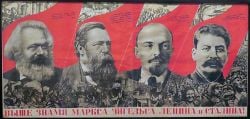Difference between revisions of "Info: Main Page" - New World Encyclopedia
From New World Encyclopedia
Svemir Brkic (talk | contribs) m |
Svemir Brkic (talk | contribs) m (Remove height limit on the ad box) |
||
| Line 24: | Line 24: | ||
</div> | </div> | ||
</div> | </div> | ||
| − | <div class="card" style="margin-top:10px; border:none | + | <div class="card" style="margin-top:10px; border:none;"> |
<div class="card-body" style="padding:1rem"><impact/></div> | <div class="card-body" style="padding:1rem"><impact/></div> | ||
</div> | </div> | ||
Revision as of 17:18, 13 July 2021
New World Encyclopedia integrates facts with values. Written by certified experts.
Template:Current article week 20
Featured Article: Marxism-Leninism
Marxism-Leninism is an adaptation of Marxism developed by Vladimir Lenin, which led to the first successful communist revolution in Lenin's Russia in November 1917. As such, it formed the ideological foundation for the world communist movement centering on the Soviet Union. A core belief of Marxism-Leninism is that a revolutionary proletarian class would not emerge automatically from capitalism. Instead, there was the need for a professional revolutionary vanguard party to lead the working class in the violent overthrow of capitalism, to be followed by a dictatorship of the proletariat as the first stage of moving toward communism.
Popular Article: Sokal affair
The Sokal affair, also called the Sokal hoax, refers to an article by Alan Sokal, a physics professor at New York University and University College London. In 1996, Sokal submitted an article to Social Text, an academic journal of postmodern cultural studies. The article used popular jargon to suggest that a scientific theory about the effects of quantum mechanics on gravitation was socially constructed. The article was published. Sokal later admitted that the article was a hoax, submitted as an experiment to test the journal's intellectual rigor.
Did you know?
John Wesley, founder of the Methodist movement, adopted unconventional practices, such as field preaching to reach factory laborers and newly urbanized masses uprooted from their traditional village culture at the start of the [[Industrial Revolut (source: John Wesley)

